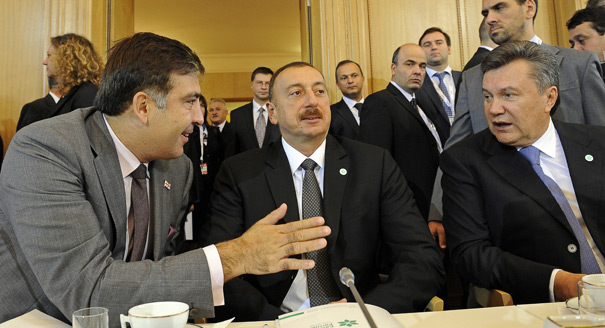Registration
Thank you!
You will receive an email confirming your registration.
Recent developments in Europe’s post-Soviet neighborhood have highlighted the region’s struggling efforts for democratization. In October, Georgia experienced a historic transition of power at the ballot box, while Ukraine held “a step backward” elections and has been widely criticized for regression in its democratic standards.
At a roundtable discussion moderated by Carnegie Europe’s Jan Techau, Carnegie’s Thomas de Waal and Olga Shumylo-Tapiola examined democratization—or the lack thereof—in these two countries and how Western projects to support democracy can be better shaped.
Event Highlights
- The State of Democratization in Georgia: Following the parliamentary elections in October 2012 and the subsequent change of the government, de Waal explained that Georgia is now facing three key challenges: lack of political competence of the newly-elected Parliament, constitutional and cultural issues related to power sharing arrangements between President Mikheil Saakashvili and the new prime minster, Bidzina Ivanishvili, and the need to radically transform the highly punitive justice system inherited from the previous government.
- Transforming the Justice System in Georgia: The new Georgian government is facing the difficult task of having an obligation to investigate misdeeds allegedly committed under the previous government and risking accusations of pursuing “selective justice,” said de Waal. A proposal to create a temporary “transitional justice” system in the form of a truth commission was suggested, which would be responsible for examining controversial cases from the past. This pattern would be comparable to similar institutions created in South Africa or Argentina, despite the smaller scale of alleged crimes in Georgia, and would serve as a temporary arrangement allowing a parallel restructuring of the existing judicial system, he added.
- A Divergence of Opinions: Discussion between the panelists suggested that even if South African and Argentinian models are not the right ones for Georgia, there is still a strong need for a temporary independent mechanism to deal with the issues of the past. Opinions were also divided on whether a truth commission would be an appropriate appellation and what would be the best way of incorporating this idea into the overall Georgian transition. It also remains to be seen whether this system could be fully functional without being unfairly used by the new government and whether it could serve as a guarantee for a new political culture in Georgia, panelists agreed. For now, the idea of monitoring by the OSCE Office for Democratic Institutions and Human Rights remains the most likely option.
- The State of Democratization in Ukraine: In Ukraine, shifting voting patterns during the 2012 parliamentary elections demonstrated that the society clearly seeks change, Shumylo-Tapiola said. However, a full bore “undemocratization’’ unfolds with power being concentrated in the hands of the president against a backdrop of judicial collapse and shrinking freedoms. While Ukrainian society can influence the country’s political situation, this influence is rather selective, such as, for instance, supporting media campaigns against libel law. Shumylo-Tapiola stated that the society is definitely not prepared to push for a reset of the country.
- What the Future Brings?: Although Georgia and Ukraine demonstrate important differences in the context of their democratization processes, they still face similar issues, panelists agreed. In Georgia, it is still unclear whether Ivanishvili will be able to move the country forward utilizing specific political achievements of the previous government without taking revenge against it. In Ukraine, there is a strong need for a bottom-up reset; yet, it remains to be seen whether the change will be inspired by the opposition or imposed by the European Union.
